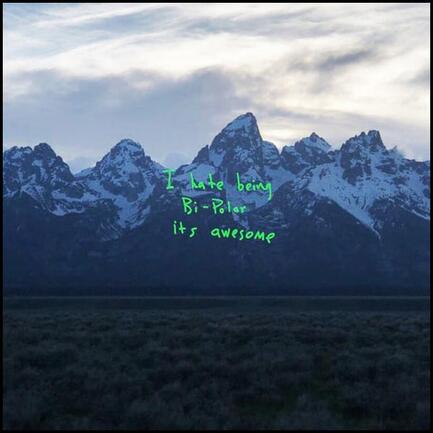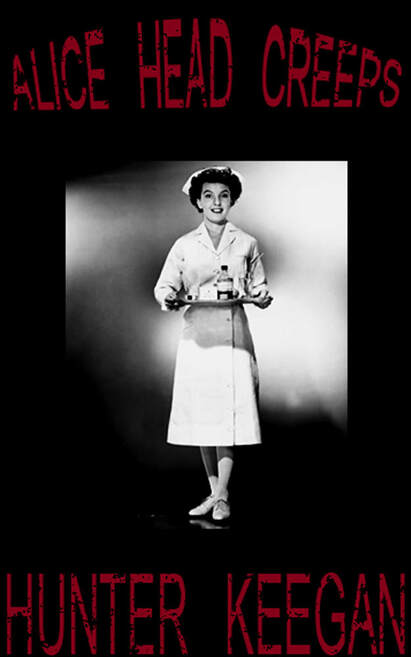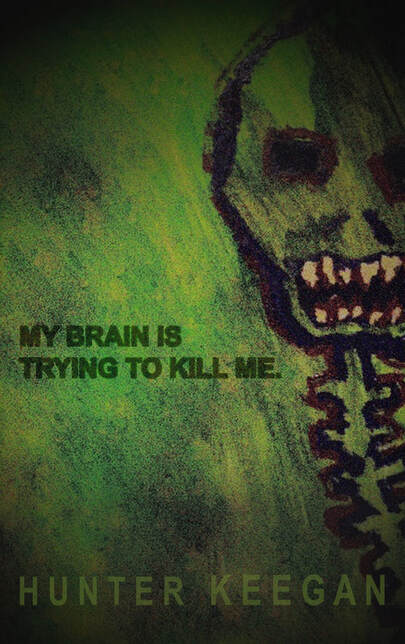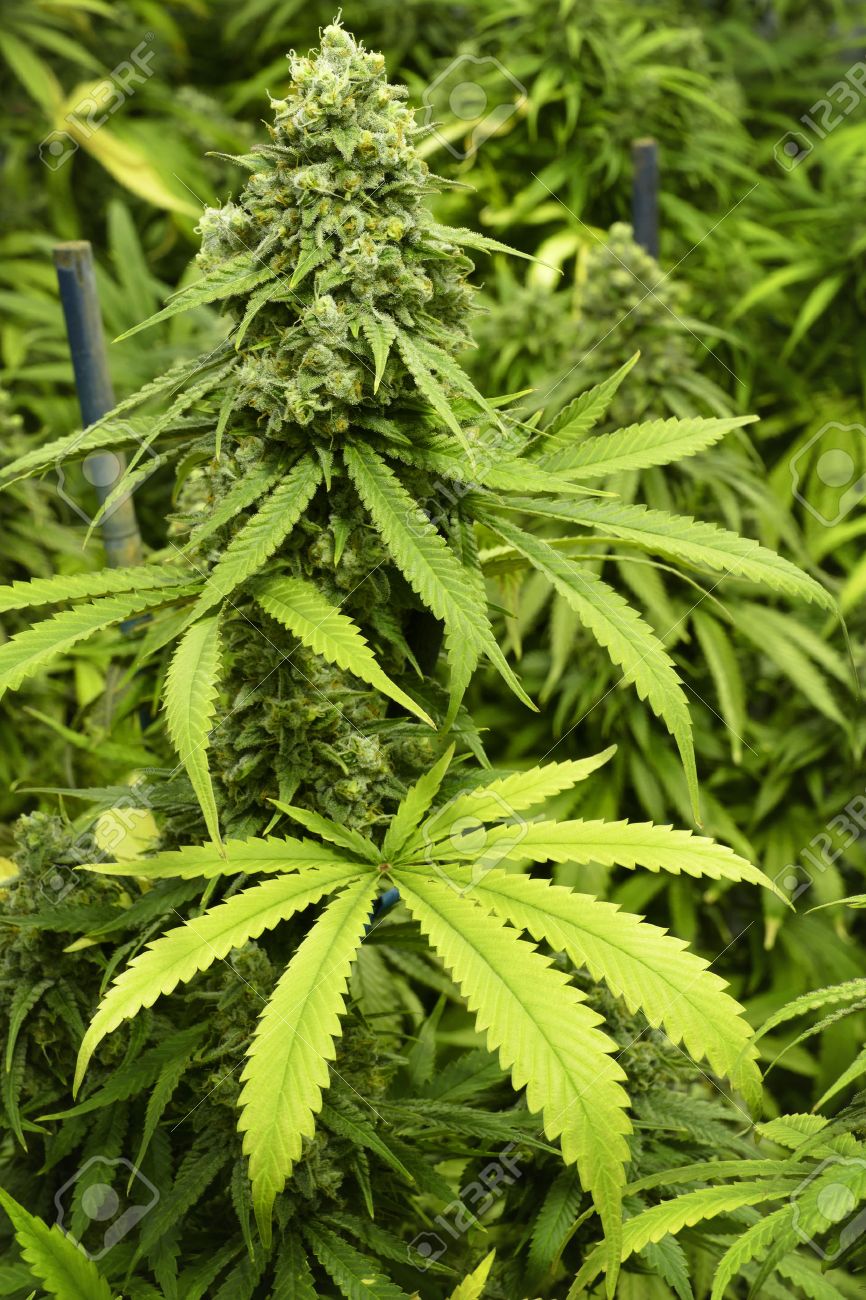Hunter Keegan
Writing
Hunter Keegan's formally published writings
|
Alice Head Creeps
Published October 2021 by Lost Dot Press Description: A short non-fiction story by Hunter Keegan. Alice Head Creeps explores the depths of addiction and depression he sunk to ... and the ghostly presence of a young psychiatric nurse who helped guide the way out. Available for purchase on Amazon in Kindle and paperback formats click here to get a copy! |
|
BP Swing Sets
Founded August 2020 About: BP Swing Sets is a mental health advocacy site founded by Hunter Keegan in 2020. It features art and writing by mentally ill people from around the world, as well as some of Keegan's own work. Click here to visit BP Swing Sets |
 Cover art for Kanye West's 2018 album, "Ye"
Cover art for Kanye West's 2018 album, "Ye"
Kanye West: The Problematic Spokesperson for Mental Illness
Published July 2020 by Lost Dot Press.
Full Text:
Last week the ever-controversial Kanye West went on a series of distressed tirades.
His statements ranged from uncomfortably self-centered to blatantly insensitive. On a literal stage, he overshared private information about his family (including a tearful announcement that he once had considered having one of his children aborted). He was displaying symptoms of a severe mental health crisis. There were even rumors that his family had made attempts at placing him on a psychiatric hold for his own safety.
Naturally, this was all highly publicized by news outlets.
Throughout this process he confused and angered millions of people for a myriad of reasons. One of the groups that was concerned by his statements was the bipolar community.
Bipolar disorder is a mental illness that causes people to swing between extreme mania and depression. While I am bipolar myself, I cannot speak on behalf of all people who live with this disease. However, I know that Kanye West’s actions tend to be of interest to myself and others familiar with forms of serious mental illness (SMI) and it’s well worth articulating why.
Since releasing his 2018 album “Ye,” which featured the phrase “I hate being bi-polar [sic] it’s awesome” on the center of its cover, Kanye West has been the subject of much interest and concern among people with bipolar disorder. Many fans saw the album’s cover as a confirmation of what had long been suspected about West: That he suffers from serious mental illness (SMI), specifically bipolar disorder, and was working to overcome this aspect of his life.
Some, like me, even hoped that perhaps he was seeking to destigmatize mental illness and bring attention to treatment for SMI.
However, just months later he confusingly stated that he had stopped taking medication for bipolar disorder. He said that felt that he wasn’t actually bipolar.
Shortly thereafter he had a spiritual awakening wherein he embraced his Christian beliefs to the extent that he decided to scrap other musical projects he was working on. Instead he decided to release a hastily composed album album entirely centered around his religious beliefs. He titled the album, “Jesus Is King.”
Kanye West’s relationship with his own mental health appears to be inconsistent. In his art, Kanye often references mental health — I even quoted one of his songs, “FML,” in my own book about bipolar disorder! This is why his actions are compelling to people who live with various forms of SMI. Many of us find it easy to relate to the strange and sometimes disastrous headspaces mental illness can take you to. We find hope in his successes and tragedy in his failures.
When Kanye West erupts like he did last week, numerous posts speculating about his mental health begin showing up on internet forums and other media. We begin fearing for his safety and fearing for the safety of the SMI community.
Our preoccupation with Kanye is not solely out of the spectacle of his actions, his fame, or his notoriety. Our concern also becomes: Will this blowback affect all of us?
A core mission that myself and many others with SMI actively work toward is destigmatizing SMI. Instead of focusing only on the negative aspects of diseases like bipolar disorder, we seek to educate the general public about what it’s like to live with SMI on a daily basis. We work to show people that our diseases are real, treatable, and are not a death sentence.
One of the primary reasons we work toward this goal is in order to be taken seriously. Because many people misunderstand the nature of hidden disabilities like bipolar disorder, educating the public and destigmatizing mental illness is paramount.
While having celebrity spokespeople can bring attention to lesser known topics such as bipolar disorder, they’re also double-edged swords. When people like West have ambiguous relationships with such sensitive subject matter, the resulting discourse is often distracting and counterproductive. Even harmful.
When I see high profile figures like Kanye West embracing the label of “being bipolar” and bringing attention to it, I naturally become excited. But I become frustrated when I see the same high profile figure backtracking on such statements and effectively muddling conversations surrounding SMI. I think this notion is shared by many in the bipolar community. This is because we, the group of people with this dangerous disease, are directly impacted when mainstream media begin haphazardly introducing buzz words like “manic” or “bipolar” or “certifiable” or “psychotic.”
The reasoning behind Kanye West’s rants from last week is, perhaps, known only to West himself. He could have been experiencing mania. Or maybe he was intoxicated. Or maybe he was experiencing symptoms of a different type of mental illness altogether.
Because we don’t know — and we can’t know — we have to leave it up to West to spearhead his own narrative. He has claimed to be part of our unique community, yet has gone on to actively disrupt the conversations around this complex disorder … and it’s upsetting.
The public deterioration of a celebrity who has, at times, spoken about being bipolar and how it’s “awesome” is toxic. My hope is that West goes on to speak more about his relationship with his mental health and clarify some of the problematic statements that he’s recently made. I hope that he will provide context and explain what was behind his meltdowns and that he will hold himself accountable and relay those thoughts in a coherent and tactful way that supports the SMI community.
Most of all, I hope that he is able to get healthy and keep his life on track (or, if you prefer, get it back on track). No healthy person wants to get themself hurt, and no healthy person wants to hurt their community.
My Brain Is Trying To Kill Me.
|
Published June 2020 by Lost Dot Press.
Description: My Brain Is Trying To Kill Me. is Hunter Keegan's debut memoir about bipolar disorder and comorbid conditions (including drug addiction, and obsessive compulsive disorder). Reviewers have described the book as "raw," "brilliantly written," and "insightful." It provides a no-holds-barred breakdown of mania and psychosis and takes readers on a journey into the world of serious mental illness (SMI). Available for purchase on Amazon in Kindle and paperback formats, Click here to get a copy! |
Progressive Perspectives
|
Published April 2020 by Shatterproof
Shatterproof is a national non-profit organization that promotes addiction recovery. Full Text: After severe issues with drug abuse and bipolar disorder I began my journey to recovery when I was 22 and for the first four years I avoided anything that I thought may have a psychotropic effect on my brain. I recall my initial weeks of “drying out.” They were rough. Like many people making a new commitment to recovery I found myself in AA and NA meetings because those settings are commonly thought of as a key component of overcoming addiction. I also recall the traditionalist approach that these types of groups advocate feeling archaic and often even judgmental. Personally, the tone and content of the established belief systems these types of groups endorse made me uncomfortable and after a couple of months I abandoned such meetings altogether. |
Instead of trying to shoehorn my own recovery goals into traditionalist approaches I opted to work with a team of mental health professionals as I continued to put my issues with drug abuse behind me.
Eventually I was at the stage in my recovery where I needed to define what “recovery” meant to me and develop a comprehensive approach to continuing to avoid alcohol and other dangerous narcotics without allowing symptoms of my other mental health issues to destroy my wellbeing.
Around age 26 I had reached a crossroads: Complications related to bipolar disorder periodically arose and potentiated symptoms of mental illness that had been key factors leading to my original struggles with drug abuse.
I wanted to lead a functional life – physically and mentally. After consulting with my doctors I began using a low dose of cannabis oil in the evenings. At first I was wary, concerned about relapse and the notion that I was betraying myself.
But marijuana became a key component of my recovery and sustained commitment to physical and mental wellbeing. A building block to help me continue on my journey. This is not to say that it can be used carelessly, like any medication it comes with side effects and can even be harmful when misused.
Subsequently I incorporated responsible cannabis use with the rest of my mental health “toolbox.” I did not stop seeing my psychiatrist or therapists after beginning to use marijuana. I didn’t stop exercising, sleeping, or eating properly (all of which are key to anyone’s health!). Recovery is a complicated process and integrating cannabis into my wider treatment system proved to be an effective harm reduction and therapeutic tool.
My stance on this issue is controversial to some but I hope that others in recovery will not avoid potentially valuable options because traditionalist viewpoints abscond them.
Exploring all treatment and recovery methods in a responsible manner is paramount – be it a medication that is prescribed to you, a physical activity that you engage in, a special diet plan, or otherwise.
Our journeys in recovery create dialogues that we can share with one another. Let’s continue to keep open minds and find new, progressive ways to live our best lives and keep the conversations going.
Eventually I was at the stage in my recovery where I needed to define what “recovery” meant to me and develop a comprehensive approach to continuing to avoid alcohol and other dangerous narcotics without allowing symptoms of my other mental health issues to destroy my wellbeing.
Around age 26 I had reached a crossroads: Complications related to bipolar disorder periodically arose and potentiated symptoms of mental illness that had been key factors leading to my original struggles with drug abuse.
I wanted to lead a functional life – physically and mentally. After consulting with my doctors I began using a low dose of cannabis oil in the evenings. At first I was wary, concerned about relapse and the notion that I was betraying myself.
But marijuana became a key component of my recovery and sustained commitment to physical and mental wellbeing. A building block to help me continue on my journey. This is not to say that it can be used carelessly, like any medication it comes with side effects and can even be harmful when misused.
Subsequently I incorporated responsible cannabis use with the rest of my mental health “toolbox.” I did not stop seeing my psychiatrist or therapists after beginning to use marijuana. I didn’t stop exercising, sleeping, or eating properly (all of which are key to anyone’s health!). Recovery is a complicated process and integrating cannabis into my wider treatment system proved to be an effective harm reduction and therapeutic tool.
My stance on this issue is controversial to some but I hope that others in recovery will not avoid potentially valuable options because traditionalist viewpoints abscond them.
Exploring all treatment and recovery methods in a responsible manner is paramount – be it a medication that is prescribed to you, a physical activity that you engage in, a special diet plan, or otherwise.
Our journeys in recovery create dialogues that we can share with one another. Let’s continue to keep open minds and find new, progressive ways to live our best lives and keep the conversations going.
Sobriety Is Not Boring
|
Published December 2019 by National Alliance on Mental Illness (NAMI)
NAMI is a national non-profit that promotes mental health awareness and recovery. Full Text: I’ve been sober for four years, and for someone who’s just out of college, that makes me somewhat of a black sheep among my 20-something-year-old peers. One of my least favorite things to hear is: “I can’t imagine not drinking. I would just be so bored.” Part of the reason this statement bothers me is because I used to think this way too. When I was actively drinking, and using other drugs, I couldn’t imagine what it would be like to spend an evening alone with my thoughts or attend a social setting unable to dull my senses and feelings. But I’m here to tell you two things:
I’ve been finding healthy coping strategies to replace old patterns of behavior that led to excessive drug use. As someone who lives not only with addiction, but bipolar disorder and other comorbid conditions, it takes a lot of effort to find the right combination of strategies that leaves me feeling fulfilled. Personally, I find creative output to be extremely rewarding. Activities like writing music, playing instruments and photography help keep my mind occupied and satisfied. Other people find hobbies such as knitting, gardening or painting to be equally worthwhile. It’s also important to take care of your body. When I was using drugs, I developed unhealthy patterns of eating and exercising — or lack thereof — that caused my weight to change dramatically, leaving me feeling constantly fatigued and lethargic. These habits have been particularly challenging to overcome, especially since the psychiatric medications I take have side effects that impact energy, appetite and motivation. During difficult times I always remind myself: “baby steps.” It really helps keep things in perspective. Start small, like going for a walk around the neighborhood, with the plan to one day try jogging. Set challenging, but obtainable, goals for yourself and stick to them. If you have the drive to push yourself a little bit harder (even if it’s just running an extra block or eating a protein bar instead of skipping breakfast), you’ll find that your stress, anxiety and physical fatigue will diminish. Regardless of your past, you are in charge of your life, and you have the ability to make positive choices. Don’t let uninformed or misguided statements like “sobriety is boring” discourage you from pursuing a healthier, happier life. Be your own support system, find healthy things that make you happy, and if you do need extra help getting on the right track, there are many free community resources available throughout the country to help you. |
(c.) 2023 Lost Dot Press, LLC. All Rights Reserved. |
|






